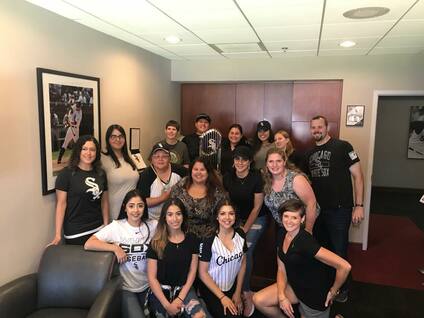Tips for Going to the Movies with a Special Needs Child. A great way to start the Holiday Weekend!5/23/2019 Tips for Going to the Movies with a Special Needs Child
Let’s face it. Summer is not always filled with all sunny, beautiful days and when you live in Chicago, there’s bound to be a few rainy days. You’ll want to go to the movies but…how exactly do you go about that with a special needs child? Don’t worry. There’s lots you can do to make this a fun experience for your family! Get Your ABA Team Involved! We all wish we could take our therapists everywhere with us. I mean, they are amazing, but that’s just not realistic. However, you can ask for their help in the background for family outings. When it comes to movie outings, some of the things they can help with are social stories, visuals, and waiting programs.
Role Play Social Interactions During an outing, social interactions are bound to happen. This can be a barrier to the special need child so it pays to practice! For some children, they may require a simple script, but for others, you can incorporate various pretend play options.
Sensory-Overload Management This is one of the bigger obstacles to going to the movies with a special needs child. Movies are a HUGE sensory experience but this can be managed with a few thoughtful tips.
Have a Good Time and Celebrate Success!!!! Going to the movies can be a real challenge with a special needs child, but it doesn’t have to be a forbidden experience. With some planning and special accommodations, a trip to the movies can be a real breeze. Oh! And don’t forget to celebrate a successful outing with your child after the movie! Perhaps you can stop and get an ice cream on your ride home! Guide by Ms. Michelle, RBT With so many different ABA providers out there, it’s important to know what to look for. You want a provider that provides a highly effective treatment model that is correctly utilized and produces the wonderful results that ABA often boasts. There’s plenty of research on the internet that may suggest that your child needs 40 hours a week, or that clinic-based therapy is the best, or RBT’s are a must…the research is endless.
So what should you be on the look out for? RESEARCH-BASED SERVICES All treatments in behavior analysis are individualized and research is the single subject design that sets ABA apart from most other therapies. When you’ve met one child with Autism, you’ve done just that, so treatment plans should be personalized to fit each child’s needs. Interventions MUST ALWAYS be research based. If you’re not sure, ASK! DRIVEN BY ASSESSMENT When you start with ABA Therapy, you’ll meet with a Board Certified Behavior Analyst (BCBA) that will conduct assessments that are most appropriate to your child’s needs. You may hear about the VB-MAPP, ABLLS, AFLS, PEAK, etc. These assessment tools will help your team determine what your child’s deficits and strengths are. The primary goal is to create programs that will work on decreasing your child’s deficits and reduce any gaps between strengths and weaknesses. The assessments completed with your child will help your BCBA make educated decisions about your child’s treatment goals. If you’re not sure about the assessments chosen, don’t forget to ask questions! SHOW ME THE DATA Every session your child has in ABA should include data. The data is collected on a wide-variety of things such as your child’s behavior, language skills, life skills, and responses to targeted program goals. Data is often reviewed daily to seek out trends that help predict that your child’s team is on the right treatment path. Your child’s therapist will be in close contact with their BCBA to seek guidance on their data trends. Changes will be made based on data collection and to ensure your child s making progress. GENERALIZATION The most important thing to know about ABA is that skills must be generalized in order to be proven successful. Just because your child can brush their teeth during therapy sessions doesn’t mean they have the skill, but when they can brush their teeth in the natural home environment independently, that makes all the difference. It is important that all programs have access to generalization. This might require the involvement of parents, caretakers, siblings and other family members. Your child’s team will help guide you to generalize skills to make their treatment plan as successful as possible. You can also ask for Parent Training to enhance generalization of skills for the most optimal results for your child. THERAPIST TRAINING It’s ok to ask what type of training and background your ABA therapists have. Some may be backed by the RBT credential, some may have a variety of other credentials to back up the quality of services they provide and many others have years of hands-on experience. Ongoing practice in ABA therapy is the key to making sure an ABA therapist is well-trained for the position. ASK QUESTIONS! If you really want to be sure you are hiring a qualified ABA team, ask questions…lots of them. And if you’re still unsure, ask more questions. Go with your gut, but never forget about the research! Guide by Ms. Michelle , RBT, Senior Behavior Therapist Incase you haven’t heard, the Chicago White Sox opened their 2019 home season by expanding the team’s inclusion efforts with a brand new Sensory Room located in Suite 460 as a new amenity at Guaranteed Rate Field and we could not be more excited! Some of our team members were able to visit the suite on Sunday, May 5, 2019 and we’re ready to tell the world about it!
The Sensory Room includes a quiet space with amazing elements such as textured wall fixtures and specialized lighting. Miss Cristy, Miss Michelle and Miss Kathy from Team ABCS enjoyed playing with sensory toys, wall mazes, and walking across the padded flooring. The room also included weighted blankets, large bean bag chairs and a safe area for field viewing so parents, family members, and siblings don’t miss the game! After collaborating with KultureCity, a nonprofit that certifies sensory inclusion, the Sox staff also received specialized training to help them identify guests with a variety of sensory needs, such as those with Autism, PTSD, and dementia, so they can increase their ability to accommodate such guests. Sensory bags are also available at Guest Services on each level that include noise-cancelling headphones, fidget tools, and even verbal cue cards! But wait! It gets better…all of these amenities are FREE! A big SHOUT OUT to The Chicago White Sox for expanding on Autism Awareness efforts and for allowing Team ABCS to take a tour of this awesome resource for our clients! For more information about services for those with disabilities provided by the Chicago White Sox, please visit www.whitesox.com/inclusion Resources: Guided by Ms. Michelle & Team ABCS MLB News. (2019). Retrieved from https://www.mlb.com/press-release/white-sox-introduce-sensory-room-at-guaranteed-rate-field WE RETHINK ACCESSIBILITY. (2018). Retrieved from https://www.kulturecity.org/ Chicago White Sox. (2019). Retrieved from https://www.mlb.com/whitesox/community/baseball 6 Tips for Creating a Therapy-Ready Home
So your ready to start in-home ABA therapy, what next? Starting in-home therapy can feel like an overwhelming process and you may not know exactly what needs to be done to prepare. Take a deep breath! Here is an easy guide for parents/caregivers to use to get their home ready for therapy.... Tip #1 Create a space in your home specifically designated for therapy. This can be in your child’s bedroom, a spare room or even an office space. You will want a small work table, cubbies/storage space for therapy materials, and plenty of floor space. Having a safe and fun place for therapy can help your child and their team feel comfortable during their therapy sessions! Tip #2 Purchase rewards/reinforcers for your child to utilize during their ABA therapy sessions. Reinforcement is a vital part of ABA therapy. It gives your child rewards for their successes and helps your child and therapist pair in a positive way. When your child has access to positive reinforcement, they will have higher rates of reaching their goals! Tip #3 Get involved! Parental involvement is crucial to your child’s therapeutic outcomes. Talk to your child’s ABA team about ways you can join in on therapy. If you feel you could benefit from individual Parent Training with your child’s team, don’t be afraid to inquire! When you get involved, your child has a better change at generalizing skills outside of therapy, leading to even more success! Tip #4 Talk to your family about their role in your child’s therapy. Perhaps you have other children that may interfere. You’ll want to make a plan to ensure they do not interrupt when it’s not appropriate. It’s also important to talk to other adults in home about their role in therapy. Your family should all be on the same page with your child’s ABA team. Using different methods of reinforcement, levels of demand placements, and interactions with your child could lead to reduced effectiveness of treatment, confusion and difficulty in learning for your child. Tip #5 Ensure collaborations! Your child may receive a variety of outside therapies. You’ll want to make a plan to get everyone linked together. Look into signing release of information documents so all your child’s teams can communicate together. Share evaluations and progress notes with all therapists involved. You could even consider scheduling meetings in your home for all therapists to come together for collaborations that can increase your child’s progress and ensure goals do no unnecessarily overlap. Tip #6 Relax! Having therapists in your home sounds like an overwhelming invasion of your personal space, but it’s not what it seems. Therapists are very mindful and respectful when they enter into your territory. They have been trained to work in the home environment and understand what it takes to make this a positive experience for everyone in your home! At ABCS, we have an experienced team of ABA professionals that are eager to review the start-up process with you and review any additional ways you can help to ensure your child’s therapy needs are met every step of the way. If you have any questions about starting ABA therapy, please feel free to give us a call at (312) 420-2093 Guide by Ms. Michelle , RBT ABCS Senior Behavior Therapist Sensory Tool KitsMany children with Autism, and other special needs, come with sensory processing challenges. Some kids struggle to find out where their bodies are in space, causing concerns with personal space and crashing into anything and anyone in their path. Other kids are either over-sensitive or under-sensitive to certain sensory stimuli, such as textures, smells, tastes, sounds and even sights. As a result, some kids may withdrawal from social situations and display aggression, sadness, becoming too intrusive, fear or becoming too active.
No matter how different their sensory processing challenges may be, they all seem to share one common trait…they struggle to self-regulate. Since their brains have trouble processing sensory input, this puts their nervous system in a constant state of high alert, making them more prone to a wide variety of behaviors. Having some “tools” available to help them stay regulated can go a long way and assist your kiddo in ways that their bodies crave! What exactly is a Sensory Tool Kit? A Sensory Tool Kit is usually a box or bin full of sensory items that help your child stay calm, focused or stimulate your child’s sensory system. You can look to your sensory tool kit when you notice your child is overstimulated, feeling sluggish, looks bored or uninterested, or having a hard time dealing with a stressful task. Sometimes it’s a good idea to have these sensory bins placed in multiple rooms in your house to ensure your child can access them wherever your child is most likely to hang out at home. At first, your child may not seek these items out on their own so you may need to guide them and encourage them to use their new tools. It’s also a good idea to make a portable Sensory Took Kit, placing various sensory items in a travel bag to have them handy when on the go. What’s inside the Sensory Tool Kits? First, you should ask yourself what type of items your child likes and dislikes? If you don’t know the answer to this, you can take your child to the store to introduce a few items and see what they gravitate towards and what they avoid. It’s a good idea to have a mixture of both to help expand sensory input. Next, you’ll want to find items that help keep your child both calm and alert so you can use these items when deemed appropriate contingent on their current sensory state. Think of items that will reduce stress and items that will engage your child for better focus. Examples of calming items might be noise-cancelling headphones or a squishy ball. Items that may assist with focus might be a small fidget cube or chewing gum. Here is a List of Sensory Items to help you make your kit: FIDGETS: CALMING: ORAL INPUT: FOCUS: How & When to use Sensory Tool Kits? Once you have all your sensory materials set up, your child may not seek them out on their own. You may need to engage with your child and explore the new items together at random. You can also explain their purpose and encourage them to use them when they need to calm down, focus or feel like they need to regulate their body. If your child does not know what his body needs, start pairing items with specific information. In example, when you notice your child is overactive, hand them a calming sensory toy and say, “Here is a squishy ball, it can help your body calm down since it looks like you have a lot of energy right now.” If you create a travel sensory kit, start introducing items when you get into the car. Once you reach your destination, help your child choose appropriate sensory items to bring with them. You could even get them a small book bag so they have easy access and start independently getting them out or putting them away on their own. When using your sensory tool kit, you want to look for times your child actually needs the tools to avoid them becoming regular toys that don’t serve a purpose. Your child should have their own toys to play with when they are naturally self-regulated. You also don’t want to push these toys too much, so introduce these items gradually to avoid any power struggles. Again, this process will all be trial and error. It will take some time to figure out what your child likes and needs to help with sensory processing. Be patient and flexible! Once things fall into place, you will create a great tool kit to help your child (and you!) stay stress-free and happily regulated! Guide by Ms. Michelle , RBT ABCS Senior Behavior Therapist Welcome to ABCS
At Autism Behavior & Childhood Services, we take great pride in the comprehensive services we offer. Working with us entails individualized, evidence-based treatments, consultations, education, support and empowerment for individuals with Autism and their families. We thrive to provide exceptional, quality services, staff satisfaction and parental satisfaction. Our primary goal is to assist our clients to achieve their fullest potential while providing support and resources whenever possible. We do this by creating high-level solutions using the methods of Applied Behavior Analysis (ABA). Our team and services are always top-notch and hard to match! We currently provide well-sought after in-home and school-based services within the Chicagoland area. See more about our services here Why Choose Us?
This means we use evidence-based practices that have been tested and approved for the best results possible. We thrive to stay up-to-date on the latest research to make sure we base all our treatment models on the most innovative interventions currently available. We take great pride in taking objective data on all goals and evaluate your child’s progress based off data instead of using best guesses or opinions. When our data reflects change is necessary, we work hard to do so in a manner that best benefits your child. Our team is seasoned and credentialed We adhere to ethical standards day in and day out. Our team is experienced, well trained and backed by various credentials to ensure your families needs are confidently met. We value our team and take great pride in all their accomplishments! Supported, Empowered and Educated ABCS knows the impact that Autism can have on the families we work with. Research reflects that when a family feels supported, educated and empowered, they have the potential to see greater improvements in their child’s behavior. Our team works hard to include parents and families whenever possible. We are committed to providing individualized care to help our families feel the support they deserve. Ready to get started? When you contact us, we can start the process of learning more about your needs in order to best match your child’s needs to the right team members, check insurance and billing arrangements on your behalf, begin the scheduling process and walk you through every step of the process of getting the services your child deserves! -Team ABCS |
Categories
All
Archives
December 2022
|




 RSS Feed
RSS Feed
